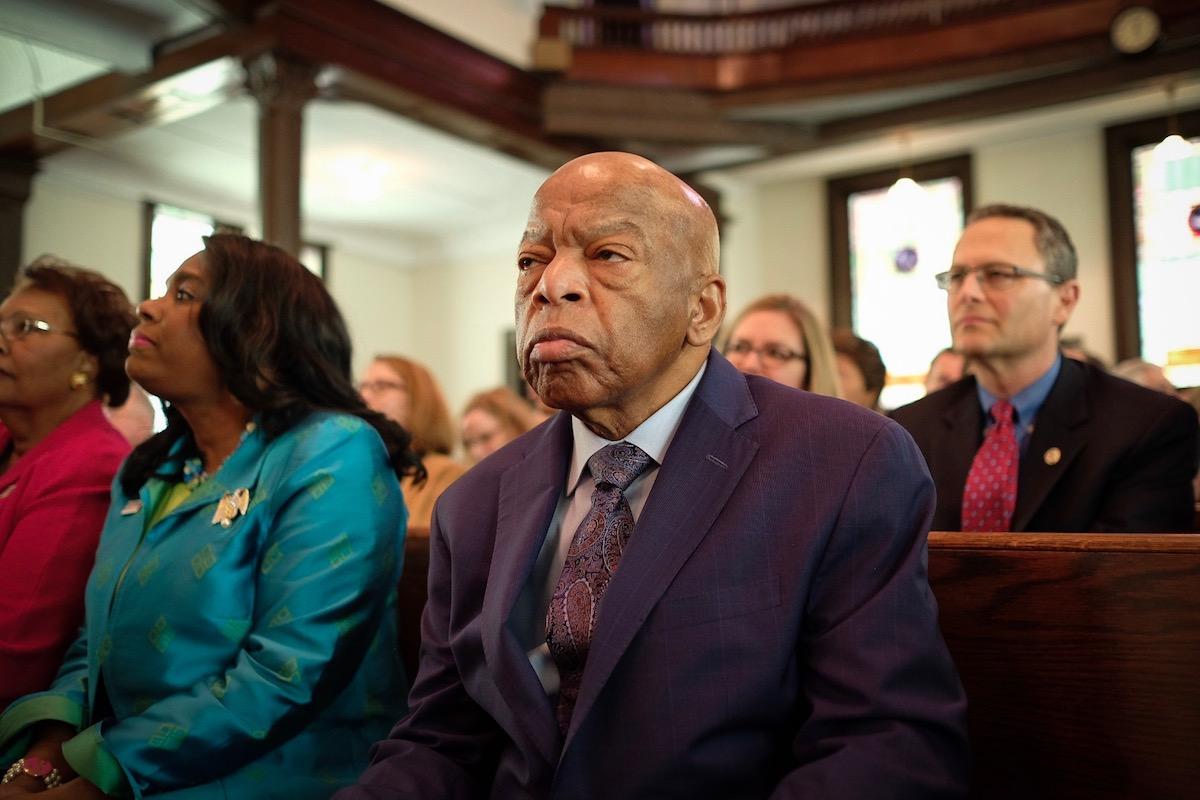A few years ago, while attending a civil rights conference in New York, I had the pleasure of hearing Congressman John Lewis speak. Afterwards, he and I chatted in the vestibule, during which he asked if I wanted to join him on his return trip to Washington, to which I most happily said yes. John had a car and driver and together with his assistant and my dear friend and former Pulitzer Prize winner and Washington Post reporter, Nick Kotz, we drove to Pennsylvania Station to catch the train home. Thus began one of the most fascinating three hours that I’ve ever had the opportunity to experience—an uninterrupted period where I had the honor of basking in his warmth and wisdom as we sat opposite each other and talked.
But that amazing late afternoon journey began with an extraordinary empathetic walk through Pennsylvania Station, for, as I moved at his side, huge numbers of African Americans appeared, all of them expressing in their looks and murmured words an incredible devotion to this amazing man. I felt the wave of love that washed over him and, inadvertently, it reached me as well. It had substance and weight and I felt as if I could reach out and touch it. It was beautiful. Only once before had I experienced the tendrils of such devotion, and that was when, on Lady Bird Johnson’s last Christmas trip to her beloved Texas ranch, I accompanied her as she walked through an adoring crowd. Now, on this day, that feeling of love was of multiplied intensity.
There followed those several hours of intimately listening to John Lewis favor me with his recollections and beliefs and, without inhibition, answer all of the questions that poured out of me. For me, since I had worked for President Johnson, it was also gratifying to hear the congressman give equal praise to Johnson and Martin Luther King for the great civil rights legislation of the 1960s.
In total, that trip and those hours with John Lewis remain a very special memory for me, and I am devastated by the untimely loss of a great man I considered my friend.
Sherwin Markman was a special assistant to LBJ until 1968. He went on to work as a senior trial lawyer for Hogan & Hartson until 1992. He is the author of a novel, “The Election”, and the editor of “Lyndon Johnson Remembered: An Intimate Portrait of a President.”



Barbara Rein says
Mr. Markman,
You indeed were fortunate to have this experience with Congressman John Lewis. Over the last day or so I have heard others talk about their brief or decades-long experiences with and of the Congressman and each were gifts to people like me who considered John Lewis to be a walking-talking mirror of the last 80 years of one Black man’s journey in the United States, as well as a brave, generous, wise, great and humble man. He stood up with and without words to further the civil rights of all men and women and addressed what he saw as ‘wrong’, for which he often found himself in ‘good trouble’.
May the memory of Congressman John Lewis be a blessing.
Gren Whitman says
In August of 1965, I participated in a four-day gathering in D.C. called the “Assembly of Unrepresented People,” which produced a “Declaration of Peace with the People of Vietnam.” (Mr. Markman likely remembers this event, which was an early challenge to President Johnson’s ruinous war policy.)
When I moved to Atlanta shortly after to work in the national office of the Student Nonviolent Co0ordinating Committee, and still all fired up, I spoke with Chairman John Lewis about the possibility of SNCC also issuing an anti-war statement, and to become the first national civil rights group to do so. Without hesitation, John said, “Yes!” and asked me to draft a statement. After I’d composed the draft, he and I edited it, and sent it out for review by the whole SNCC staff. After it was finally approved at a staff conference that November, John himself called a press conference and issued SNCC’s anti-war statement in January 1966. It caused quite a commotion.
The point of this is: John Lewis didn’t need to be persuaded for an instant to have SNCC publicly oppose the Vietnam War. He knew doing this might cost the organization some support; even so, that didn’t dissuade him. Without John’s early, enthusiastic, and full support, the anti-war statement would never have moved forward.
As he was always moral, courageous, steadfast, kind, and, yes, always just fun to be with, we will sorely miss this extraordinary American citizen and hero, John Lewis.